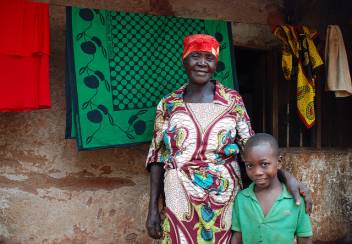Professor Ian Linden is Policy Director at the Tony Blair Faith Foundation.
 “Family” is a term that prospers from vagueness. It invariably gets a good press from religious leaders and politicians and a not so good one from psychiatrists and anthropologists.
“Family” is a term that prospers from vagueness. It invariably gets a good press from religious leaders and politicians and a not so good one from psychiatrists and anthropologists.
Today’s default position is usually that a family is made up of a parent or parents and children, in other words the “nuclear family”.
It is a position that is, of course, contested. The surprising thing is that most religious leaders, even in parts of the world where many families are extended adopt the default definition.
Whether in Friday khutba or Sunday preaching, synagogue or temple, you will be lucky to hear the word “grandparents” in a sermon on the family.
A new class of grandparents
In Europe and North America, where both parents – or single parents – often work, grandparents can play a vital role in family life. I have discovered a new class of grandparents who repair toilets, paint houses and change nappies while their offspring go about their lawful professional pursuits. Invaluable members of modern society you might say.
We are a long way from Granny in her cottage, sitting contently by the fireside graciously receiving cups of tea, at the heart of the family. And what divorce court considers access to the children for the grandparents?
The new providers
The situation in the less industrialised world also has some surprising features. I remember sitting in an August assembly of African bishops and archbishops listening to a speech on the family by a Vatican official. No one would have guessed that in many parts of Africa the only thing sustaining the family was surviving grandparents, looking after AIDS orphans, stretched to their physical and financial limits.
It is obvious that older people are no less able to “make their own history” and be the subject of work for the common good rather than recipients of it, as anyone else. Social and pastoral action in Africa in both Muslim and Christian communities ought to concentrate on their needs as the new providers and home makers. The alternative is desperate individuals, unable to cope, sometimes even the victims of witchcraft accusations.
Agents of healthcare
At the same time, it is the trust and authority of elders that makes them ideal purveyors of health messages. Whether it is HIV and AIDS or malaria and tuberculosis, suitably trained older people in parish and mosque council and community can influence households in their neighbourhoods. If people of different faiths are to live harmoniously together, wisdom will be at a premium.
One thing is clear: Health and the care of future generations is a common entry point into useful dialogue for people of all faiths and none. Discuss health and everyone has the same concerns irrespective of nationality, ethnicity or religion. These are privileged starting points of interfaith dialogue.
It is time we thought of older people as potential agents of holistic approaches to health, as subjects and agents of healthcare, as well as potential translators between the ideas and culture of different generations.
In these days of maximum transparency I had better declare an interest. At the last count this means declaring 14 grandchildren.
Find out more about the Tony Blair Faith Foundation.
Keep checking our Age Demands Action webpages and our Twitter feed for updates on our 1 October work with TBFF to bring generations together.
